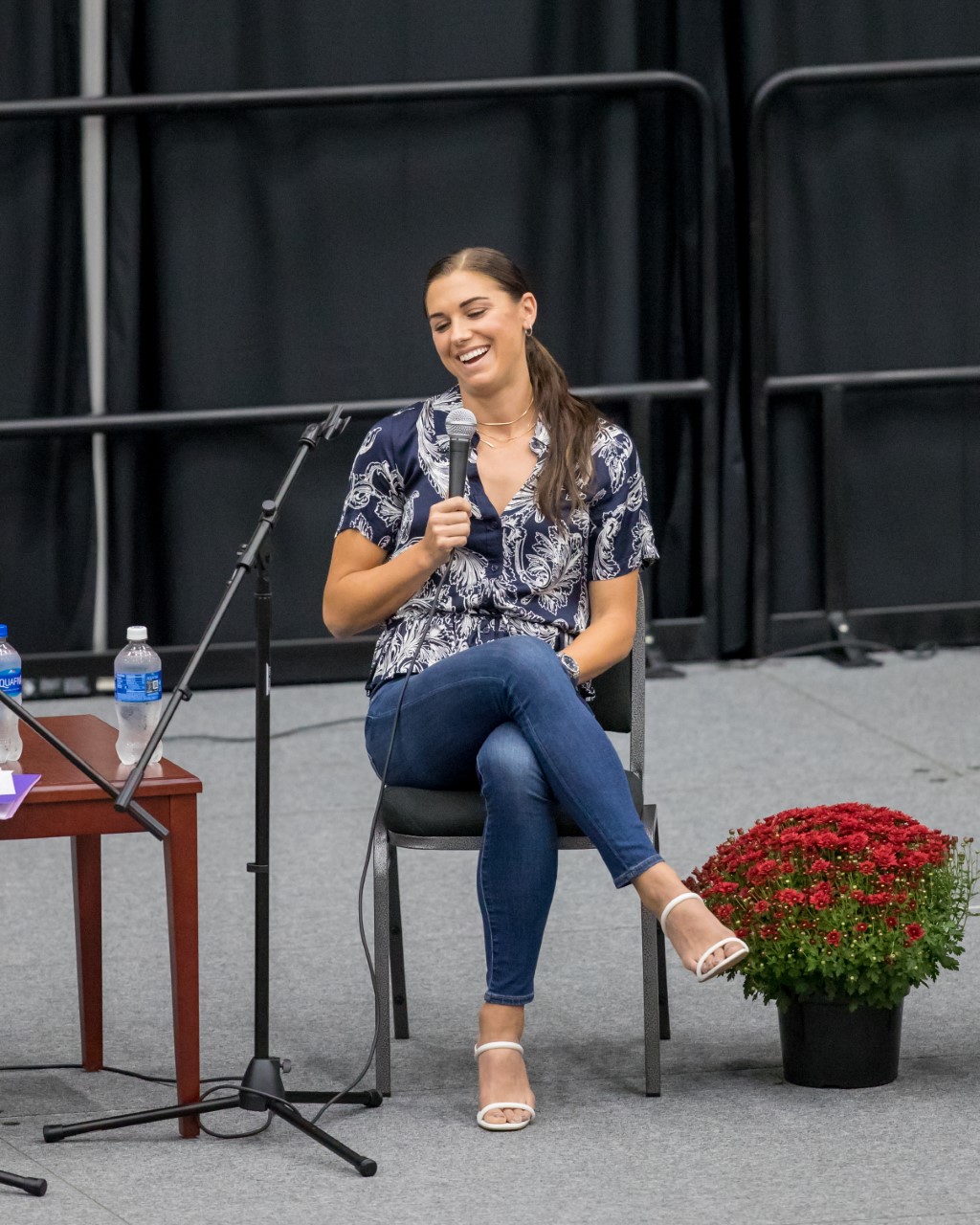Trotting along the outer edge of the penalty area against England during a semifinal match of the 2019 FIFA Women’s World Cup, U.S. women’s national team star Alex Morgan took off behind the defense on a perfectly timed run toward the English goal.
Deadlocked with their British rivals, teammate Lindsay Horan lofted a perfectly placed ball toward Morgan. Morgan, on her 30th birthday, rose into the air and sent a booming header past English goalkeeper Carly Telford for the game-winning goal.
Running toward the sideline with her arms extended, Morgan suddenly stopped and rose her left hand to her lips—feigning the motion of drinking a cup of tea, with her pinky extended, of course.
The University Program Board, in conjunction with the Gender Studies department and the President’s Commission on Women, hosted “A Conversation With Alex Morgan” in the Morrow Field House. Dr. Christine Pease-Hernandez, an assistant professor of communication, moderated the event along with a panel of Dr. Cindy LaCom, the director of the gender studies department, Jessica Griggs, the SRU women’s soccer coach, and two students, Maggie Calvert and Tyler Spence.
Morgan was able to explain the celebration, give her thoughts on the backlash and much more during her visit to Slippery Rock University Sunday afternoon.
“My teammate Megan Rapinoe has the best celebrations ever and I was like, ‘OK, I need to step it up here. She’s taking all the spotlight and deservingly so.’ I thought of [the tea sip] earlier that day and because we were playing England, it was just a coincidence,” Morgan said.
While the team faced criticism throughout the tournament, starting with an “arrogant” display during a 13-0 victory over Thailand in the group stage, Morgan said the outpouring of anger over her celebration came as a shock.
“The criticism came and, for me, it was unexpected and I was like, ‘Well, why can’t I celebrate? Why can’t I do what I want to do after I score?’ Whether it’s a knee slide or sipping tea, this is sports. You’re supposed to celebrate your successes,” Morgan said.
Back in July, when the game took place, Morgan said she felt like it was a double standard for the women, although she admitted she may have used the wrong analogy, she still feels the same way.
“Why would males be able to celebrate in any fashion they like when they score a touchdown or a goal and we’re criticized for being too arrogant or confident?” Morgan asked. “It’s like we’re taking up too much space. I feel like that’s the case in a lot of things I do as an athlete. In my rise to becoming one of the best soccer players in the world, you’re appreciated, you’re celebrated and when you get to the top, you’re criticized. ‘Take it down a notch, you’re taking up too much space.'”
Despite a 2-1 win over England and a place in the final of the World Cup, Morgan’s celebration and the U.S. team’s “cocky attitude” still dominated the headlines. She explained how for too long, she and her teammates had been shunted aside. Well, no longer.
“After the win, we had this criticism that I was faced with for the celebration, that the team became faced with, which was how we were too arrogant in our win and how we needed to tone it back,” Morgan said. “Well, we’ve been told our whole life that we’ve taken up too much space. But we’re living in the space now and we’re going to own it. So, we took an approach that was unapologetic because we’re the best in the world and we deserve to celebrate that way.”
Morgan and Rapinoe, who each scored a tournament-high six goals, went on to defeat the Netherlands, 2-0, in the final and won a second consecutive World Cup for the United States.
The best soccer team in the world, according to Morgan, won back to back World Cups and still doesn’t have the same opportunities as their compatriots on the men’s side.
According to Morgan, the wage gap, while a sizeable portion of the team’s gripe with the U.S. Soccer Federation, is only part of the problem the team deals with on a day to day basis.
“The big thing that everyone has stuck with has been equal pay, but it’s so much bigger than that,” Morgan said. “It’s about equality with both compensation and treatment. It’s not only for the players, but it’s also for the coaching staff, the medical staff and it’s the number of times we’re together with our team.”
With the success of the team, compared to the lack thereof from the men’s team, Morgan admitted her team may make as much as the men, but they’re forced to perform double the work.
The lawsuit against the U.S. Soccer Federation, filed on March 8, followed an equal opportunity claim in 2016 which Morgan said never received any governmental feedback. The lack of response or action from the Federation forced the team to take action into their own hands, according to Morgan.
While Morgan said there is no ideal time to file a lawsuit against an employer, the team is confident and hopeful in building a compelling case against its employer—even if no one action directly led to the lawsuit.
“There’s a lot that built up [to the lawsuit],” Morgan said. “I think we were faced with discrimination when we were younger that we didn’t even know about because that’s the way it was, but when I got onto the national team, I realized little things here and there.”
Compared to the men’s team, on just the national team scene alone, the women lack many of the basic luxuries and necessities afforded to a professional sports team, Morgan said.
“Besides compensation, because that’s a big piece, it’s the hotels and the medical staff,” Morgan said. “If we’re with our team 150 days out of the year, traveling around the world, why don’t we have a full-time athletic trainer or physical therapist? Why does the men’s team have 30 people on their staff list and we only have 16? When it comes public that the coach of the men’s team was making $3 million a year and got fired, and they had to buy out his contract, and our women’s coach is making $250,000, how are we getting the best coaches with that compensation? How are we getting the best treatment? We never had a system laid out. We just had a general manager named for the very first time this year.”
Morgan said that just because this is the way U.S. soccer has operated in the past doesn’t mean the same behavior and treatment should continue in the future.
In her fight for equality in soccer and sports in general, Morgan acknowledged that she does benefit from having 22 amazing teammates that support each other in every situation. While the fight has not been easy, she said it’s been necessary.
“If it was easy, every woman would do it,” Morgan said. “Nothing important is done easily. It’s important to believe in yourself and what you believe in. The first step is always the hardest.”
In the spirit of betting on themselves, Morgan along with teammates Allie Long and Kelley O’Hara decided to go all-in on themselves and start the “USA vs. Everybody” apparel movement together.
“We felt like there wasn’t enough apparel available for fans before the World Cup,” Morgan said. “As we got to France, there was a lack of merchandise. It goes to show the underinvestment of women in sports and how when you do invest in women, it pays off. We said, ‘screw this, we’re not going to keep waiting,’ so we’re going to do this ourselves.”
Ironically, Morgan and her teammates underestimated themselves. Initially only making a couple of hundred shirts in various sizes, their stock sold out in just two days.
Before the final against the Dutch, Morgan explained how they came up with the idea of “USA Beat Everybody” shirts. Despite having a match still to go, she said she knew the U.S. would come away with the win.
She had her husband Servando Carrasco bring over a box of the shirts, and although she wouldn’t even touch them until after the final, they were able to bring them out during the victory celebration after beating the Dutch.
Underinvested and underrepresented in sports, Morgan explained how it wasn’t until the release of her book series, “The Kicks,” six years ago that she became aware of the disparity between men and women in children’s books and shows.
“My book series was the first time that I realized there wasn’t as much content that features female athletes as opposed to male athletes,” Morgan said. “The books and stories that I read, listened to and watched were mostly male dominated.”
The lack of mainstream female role models on television and in print, in not just soccer, affected her without realizing it as a child, so it’s something she’s made sure to remedy.
“I never thought about it when I was younger, but growing up, I was like, ‘Well, who were my role models?’ When I got older, it was Abby [Wamback] and Mia [Hamm], but I didn’t really have these role models, and it’s not like they weren’t there, I just didn’t have access to hearing about them,” Morgan said.
While Morgan is known for being a world-class soccer player, she emphasized being an athlete does not define her.
“We are more than athletes,” Morgan said. “We are so much more, and we want to share that and celebrate that. [Being a role model] did start with my book series and it expanded into so much more than that.”
The responsibility that comes with being a world-class athlete, in addition to being surrounded by women of all different backgrounds, ethnicities and sexual orientations, means so much more than just playing soccer. The opportunity to use the platform to educate and exact change are crucial, according to Morgan.
“For Megan [Rapinoe] and my other teammates who are a part of the [LGBTQ+] community… it’s just supporting them. That’s exactly what it means. Privately and publicly supporting them. It’s educating other people who aren’t necessarily in a situation or know anyone in the community. Being able to listen and learn,” Morgan said.
The experience in the fight for gender equality in soccer has allowed the U.S. team to provide help worldwide with other countries’ Collective Bargaining Agreements, Morgan said. The team has been able to lead women’s soccer by example.
Aside from the worldwide fight for gender equality in soccer, Morgan also garnered worldwide recognition for her play on the field.
Along with Rapinoe and English fullback Lucy Bronze, Morgan has been named as one of the three finalists for the FIFA Player of the Year award. The award ceremony held Monday in Milan will give Morgan the chance to become the first American to win the award since Carli Lloyd in 2015 and 2016.
While speaking in Slippery Rock Sunday, Morgan’s parents were already in Milan waiting for her later in the day.
“My family just landed in Milan, and they were like, ‘Where are you?’ and I was like, “Slippery Rock!” Morgan said.
As Dr. Pease-Hernandez joked, Morgan will be in Milan Monday, still thinking about Slippery Rock.









